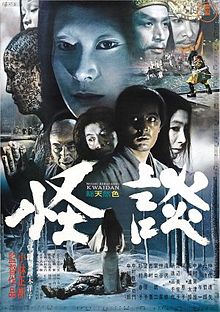 Hubrisween Central ♠ Letterboxd Page
Hubrisween Central ♠ Letterboxd Page
 Kwaidan is an archaic version of the Japanese word Kaidan which, in its simplest translation, can be understood to mean “ghost stories”, but its meaning is actually more subtly complex than that: and that is a fair metaphor for director Masaki Kobayashi’s film of the same name. The title also derives from Lafcadio Hearne’s 1904 book of folklore, Kwaidan: Stories and Studies of Strange Things, though the four stories translated to cinema are actually from two of his collections.
Kwaidan is an archaic version of the Japanese word Kaidan which, in its simplest translation, can be understood to mean “ghost stories”, but its meaning is actually more subtly complex than that: and that is a fair metaphor for director Masaki Kobayashi’s film of the same name. The title also derives from Lafcadio Hearne’s 1904 book of folklore, Kwaidan: Stories and Studies of Strange Things, though the four stories translated to cinema are actually from two of his collections.
Each story is presented with no connecting arc, with perhaps the only concession to their prose origins the occasional bit of voice narration (the deeper translation of kaidan alludes to the stories’ origins as oral tradition, anyway).
 In The Black Hair, an impoverished samurai leaves his faithful, patient wife to marry a noblewoman and rise to a profitable post; that marriage is an unhappy one, and the samurai torments himself with memories of the woman he treated so badly. Years later, he returns to his old house, to find it in poor repair, except for the rooms where his wife works her loom. She is radiantly happy to welcome him back into her life. This would be a happy ending, except the samurai wakes up the next morning to discover he has been sleeping next to the rotting corpse of his wife, who died of a broken heart years before.
In The Black Hair, an impoverished samurai leaves his faithful, patient wife to marry a noblewoman and rise to a profitable post; that marriage is an unhappy one, and the samurai torments himself with memories of the woman he treated so badly. Years later, he returns to his old house, to find it in poor repair, except for the rooms where his wife works her loom. She is radiantly happy to welcome him back into her life. This would be a happy ending, except the samurai wakes up the next morning to discover he has been sleeping next to the rotting corpse of his wife, who died of a broken heart years before.
 This is followed by The Woman of the Snow, which begins with two woodcutters caught in a blizzard. They seek what shelter they can in the shed of a boatman, but that night a ghost enters the shed, and her breath causes the older woodcutter to immediately freeze to death in his sleep. She spares the younger man, on the promise that he never tell anyone what he has seen, ever. A year later, the surviving woodcutter meets a young woman travelling on the road, alone, and they fall in love. Yes, Tales from the Darkside: The Movie fans, you should be recognizing this tale, though the ending here is much more bittersweet, though no less tragic.
This is followed by The Woman of the Snow, which begins with two woodcutters caught in a blizzard. They seek what shelter they can in the shed of a boatman, but that night a ghost enters the shed, and her breath causes the older woodcutter to immediately freeze to death in his sleep. She spares the younger man, on the promise that he never tell anyone what he has seen, ever. A year later, the surviving woodcutter meets a young woman travelling on the road, alone, and they fall in love. Yes, Tales from the Darkside: The Movie fans, you should be recognizing this tale, though the ending here is much more bittersweet, though no less tragic.
 After an Intermission, the movie resumes with probably its most famous sequence, Hoichi the Earless, which is the tale of a young blind biwa player living in a temple. His performance of the song cycle telling of a sea battle that was the death of an entire clan is so good, he is called upon by the spirits of that clan to perform it repeatedly at a nearby graveyard. Being blind, Hoichi thinks he is performing in a grand castle; these nocturnal performances are slowly killing him, and to save his life, the monks paint prayer sutras all over his body to protect him. They neglect, however, to paint them on his ears for some reason, and, well, the title itself is a massive spoiler.
After an Intermission, the movie resumes with probably its most famous sequence, Hoichi the Earless, which is the tale of a young blind biwa player living in a temple. His performance of the song cycle telling of a sea battle that was the death of an entire clan is so good, he is called upon by the spirits of that clan to perform it repeatedly at a nearby graveyard. Being blind, Hoichi thinks he is performing in a grand castle; these nocturnal performances are slowly killing him, and to save his life, the monks paint prayer sutras all over his body to protect him. They neglect, however, to paint them on his ears for some reason, and, well, the title itself is a massive spoiler.
 The final story, In a Cup of Tea, was excised for American audiences, to bring the movie under three hours, I suppose. It’s a fragment, an unfinished story in Hearn’s collection, regarding a samurai who keeps seeing a man’s face in a cup of tea, and when he drinks it, finds himself bedevilled by the ghostly man and his equally ghostly retainers. Kobayashi supplies an ending, which is an appropriate button for the movie.
The final story, In a Cup of Tea, was excised for American audiences, to bring the movie under three hours, I suppose. It’s a fragment, an unfinished story in Hearn’s collection, regarding a samurai who keeps seeing a man’s face in a cup of tea, and when he drinks it, finds himself bedevilled by the ghostly man and his equally ghostly retainers. Kobayashi supplies an ending, which is an appropriate button for the movie.
What none of these synopses will prepare you for is the unearthly, fabulous beauty of Kwaidan. This movie was made for blu-ray, as it is an unending buffet of visual delights. The skies of Woman of the Snow seems pulled from a painter’s easels, full of eyes watching the plight of the villagers beneath. Hoichi begins with the song of the sea battle, a massive painting of the event intercut with the actual battle, like figures from the painting come to life. It is a movie unto itself, and it is breathtakingly gorgeous.
 Coming off the success of Harakiri, Kobayashi made the most expensive movie in Japanese history, supplanting The Seven Samurai. 350 million Yen is the figure given; the sound stages are massive, and the control this gives Kobayashi over the picture is not wasted. Roger Ebert called it “one of the most beautiful films I have ever seen,” and there is no way I could possibly improve over that simple statement.
Coming off the success of Harakiri, Kobayashi made the most expensive movie in Japanese history, supplanting The Seven Samurai. 350 million Yen is the figure given; the sound stages are massive, and the control this gives Kobayashi over the picture is not wasted. Roger Ebert called it “one of the most beautiful films I have ever seen,” and there is no way I could possibly improve over that simple statement.
 Amazing, beautiful, surprisingly humanistic. Revisiting this movie years after my first viewing was one of the smartest things I have done this year.
Amazing, beautiful, surprisingly humanistic. Revisiting this movie years after my first viewing was one of the smartest things I have done this year.


